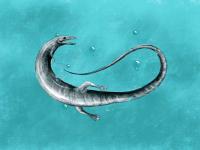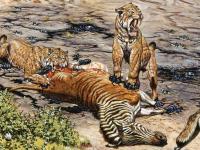Paleontologists Find First Placodont Fossil in the Algarve
Paleontologists from Lisbon’s Universidade Nova have found the first placodont fossils in Portugal, they have announced.
Paleontologist Hugo Campos and Octávio Mateus told Lusa that they found the placodont “ribs and a Shell” in 2016, but only now disclosed the discovery by publishing a study in the catalogue for an exhibition “Loulé: Territories. Memories. Identities”, on display at the National Archeology Museum.
“Placodonts are a group of marine reptiles that had not been identified in Portugal, but are known in other parts of the world”, said Octávio Mateus, who supervised Hugo Campos’s paleontology Master’s thesis about Triassic vertebrates in the Algarve.
The study “Loulé more than 220 million years ago: the fossil vertebrates of the Algarve in the Triassic”, published now, describes that the placodonts lived in the sea during the Triassic period between 250 million and 200 million years ago, feeding on mollusks and they had boney plates that made them look a bit like turtles.
A large number of these boney plates, which the scientists call ‘osteoderms’, were found around Loulé and Silves in the Algarve in 2016 and 2017.
The researchers believe that these placodonts were of the ‘Henodus’ type because of the long, flat, hexagonal shape and without ornamentation of the shell and the lack of teeth.
The village of Penina, near Loulé, has what is considered to be the main deposit from the upper Triassic in Portugal and one of the most important for vertebrate paleontology in the country.
The deposit has turned up ten ‘Metoposaurus algarvensis’ (an amphibian similar to a salamander), bivalves and fish scales, phytosaurs (similar to crocodiles) and placodonts, but there may be as many as 20 animals.
The Triassic period, the first period of the Mezoic era, was a period in history when the continents were still all jo9ined together in a super-continent (Pangeia) and when the dinosaurs and other animals appeared and spread round the world.
Source: www.theportugalnews.com








